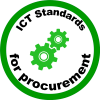Procurement needs a new approach to account for the challenges and potential of digitalization to create value and new service to citizens. The European Catalogue will connect the dots for procurers by listing applied guidelines in areas which help create digital value: strategic procurement (green, social, innovative), the seven principles of the EU eGovernment Action plan 2016-2020, digital skills, interoperability and reuse as facilitated by the European Interoperability Framework and the Connecting Europe Facility Building blocks.
Traditionally, public procurement has been focusing on procurement law and processes and on price. Very logically, the public procurement of digital focused on automation by digitalising processes. Moving paper to digital was at the heart of the procurement of digital, perhaps also because of the available market of ICT solutions which heavily relied on workflow and database technologies.
But soon public services started to use technologies beyond process automation and developed know-how to offer new services and connect to citizens. Internet of things is used in cities to create urban mobility services. Cloud increases the coordination between administrations by creating an exchange platform, which can then serve to develop analytic services using big data.
The EU catalogue will foster coordination among governments when it comes to the procurement of digital goods. It will help build an upstream understanding of the digital and its specifics in terms of procurement by listing applied guidelines from various streams linked to digitalisation, such as
-
Strategic procurement takes up on three societal challenges: green, innovative, and social. See EU related websites such as
- The buying green handbook which helps lower environmental impact and the EU GPP criteria are developed for various sectors to facilitate the inclusion of green requirements in public tender documents,
- Buying social is a guide to taking account of social considerations in public procurement,
- Innovative procurement, public procurement of innovation,
The Catalogue refers to strategic procurement EU guidelines, associating them to the appropriate procurement needs, and it calls practitioners to submit national guidelines, applied practices, or experiences.
- Besides providing a framework to help Member states collaborate in the modernization of public administrations, the EU eGovernment action plan 2016-2020 also offers seven principles which create value in the digital world: digital by default, once only principle, inclusiveness and accessibility, openness and transparency, cross-border by default, interoperability by default, and trustworthiness & security.
The Catalogue calls practitioners to submit applied guidelines or share experiences on applying the seven EU eGovernment principles.
- Digital-first initiatives (Estonia, UK with g-cloud, etc..) are success stories in Member States based on a well-articulated plan and on clear principles and objectives. Success can be replicated and the wheel should not be reinvented.
The Catalogue invites practitioners to submit applied guidelines or share experiences on national digital-first strategies.
- Interoperability removes the costs associated with developing solutions with external ICT systems. Reusing is also an easy way to create value at a reduced price. Procurement that accounts for reuse and interoperability increases digital value.
The EU catalogue is part of the new European Interoperability Framework (EIF), see recommendation 23 of Annex II. The EIF offers public administrations concrete recommendations on how to improve governance of their interoperability activities, establish cross-organisational relationships, streamline processes supporting end-to-end digital services, and ensure that both existing and new legislation do not compromise interoperability efforts. More in the EIF.
Recommendation 23:
Consult relevant catalogues of standards, specifications and guidelines at national and EU level, in accordance with your NIF and relevant DIFs, when procuring and developing ICT solutions.
The EU Catalogue seeks to facilitate the reference in procurement of Connected Europe Facility (CEF) reusable digital services. Given a specific procurement need, the Catalogue refers to the CEF reusable digital service and it invites practitioners to submit national guidelines, applied practices, or experiences in the procurement of such CEF reusable blocks.

